Bottom Round Roast Recipe
Published November 8, 2024. This post may contain affiliate links. Please read my disclosure policy.
This melt-in-your-mouth Bottom Round Roast Recipe is dry-brined, coated in garlic herb oil, and slow-cooked to tender perfection. It’s one of my favorite low-maintenance cuts of beef to dress up on the weekend and serve for unforgettable Sunday dinners or roast beef sandwiches.
This classic beef roast is a perfect centerpiece for your next family dinner. Serve it with more foolproof side dishes, like Homemade Cornbread, Crispy Smashed Potatoes, and Boiled Green Beans.
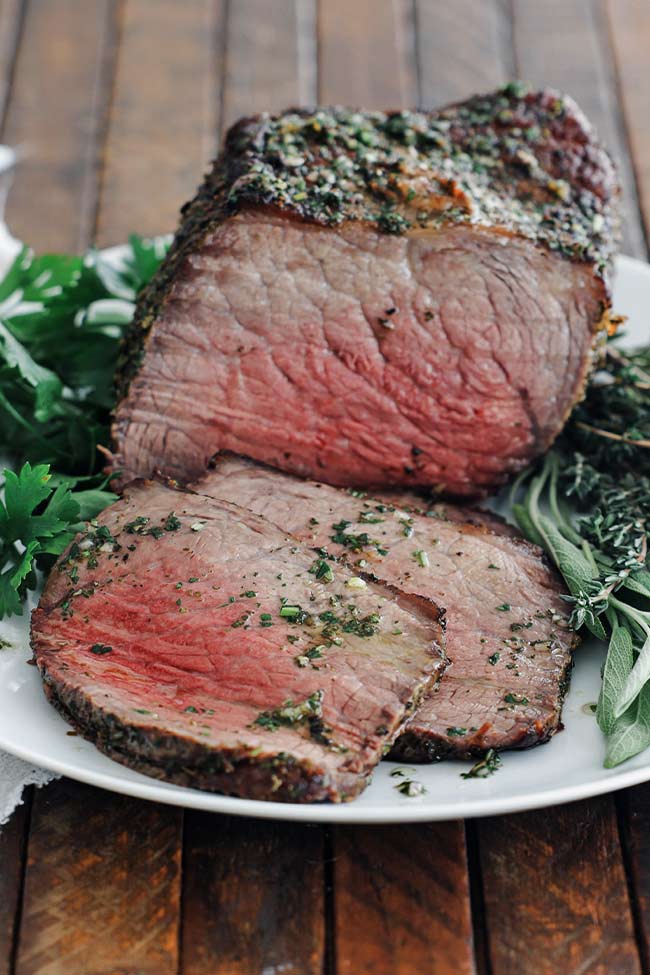
Beef Bottom Round Roast
Comforting Sunday dinners with the family call for a bottom-round roast. This famously affordable, lean, and tender beef roast transforms into a mouthwatering main dish when slathered in oil and fresh herbs and slow-cooked in the oven. I took the preparation a step further by dry brining the meat in a salt rub overnight to deepen those natural flavors and increase the moisture, but even if you skip this part, you’ll still have a beef dinner everyone at the table will love.
In addition to being budget-friendly and naturally tender, bottom round roast is a versatile cut of beef you can turn to whenever you need to serve a crowd. This recipe shows you how easy it is to prepare on its own for over-the-top Sunday meals; however, you could also place the bottom round roast in a pot with an aromatic red wine braising liquid and hearty vegetables to make Classic Pot Roast. However you decide to experiment with this roast, one thing’s certain: the tender beef slices are always made better with a dollop of horseradish or a drizzle of beef au jus on top.
That meat will also leave you with some pretty epic leftovers. Slice up the beef and load them into Kaiser buns with lettuce, tomatoes, cheddar cheese, and horseradish sauce for a roast beef sandwich you’ll want to dig into for weekday lunches or a quick and delicious dinner.
Ingredients and Substitutions
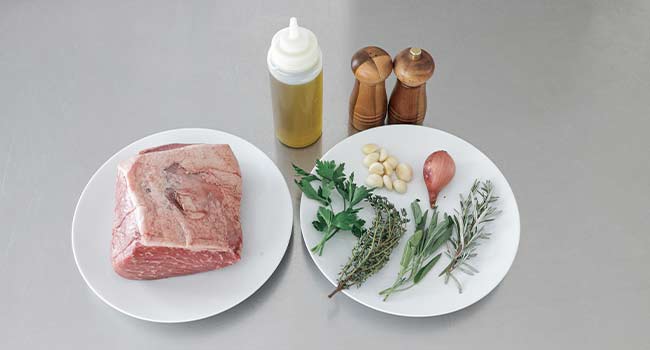
- Bottom round roast — This is a lean and budget-friendly cut of beef from the cow’s hindquarters. Because it isn’t naturally tender, it’s best to slow-roast the beef to help tenderize the meat and bring out those natural flavors and juices.
- Coarse salt – The beef is rubbed with coarse sea salt or kosher salt (known as a dry brine) before it’s cooked to yield extra tender meat and an impressive golden-brown crust around the outside.
- Oil – Olive oil is used as the base of the aromatic herb oil brushed all over the meat. It not only adds flavor but also encourages browning.
- Fresh herbs — The herb oil uses Fresh thyme, rosemary, and sage. If you only have dried herbs on hand, substitute 2 teaspoons.
- Aromatics – Minced garlic cloves and a diced shallot add a savory element to the herb oil to balance the flavors.
How to Make Bottom-Round Roast
Truss the beef with butcher’s twine.
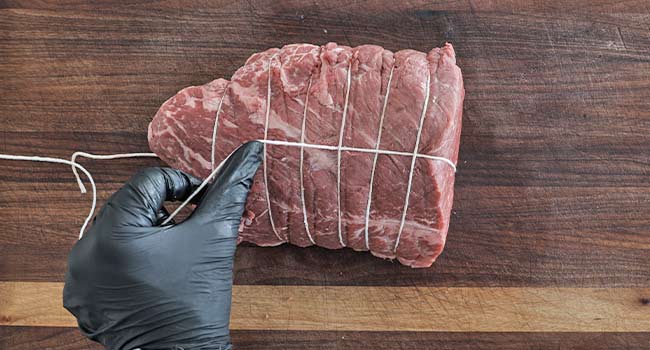
Transfer it to a rack placed on a sheet tray, pat all sides dry with paper towels, and generously season with salt.
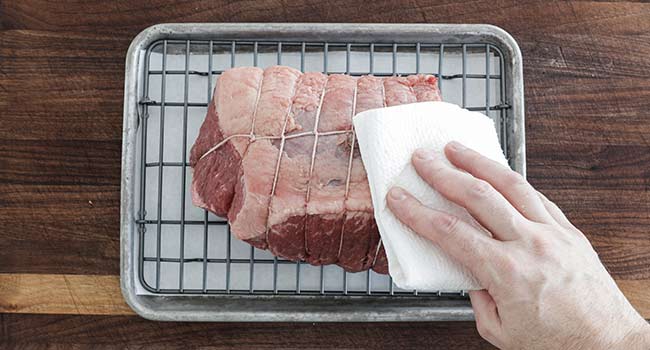
Place the roast in the fridge for at least 4 or 24 hours to dry brine.
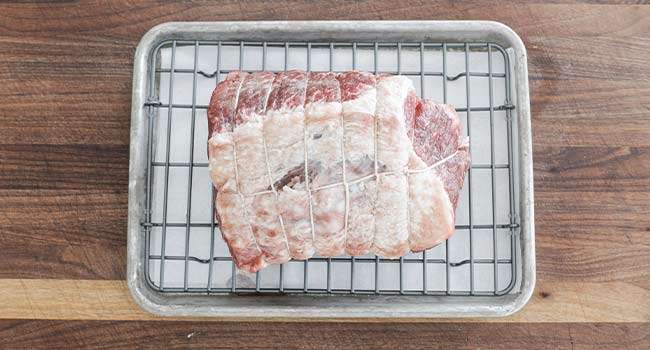
Remove the beef from the fridge and season it with black pepper.
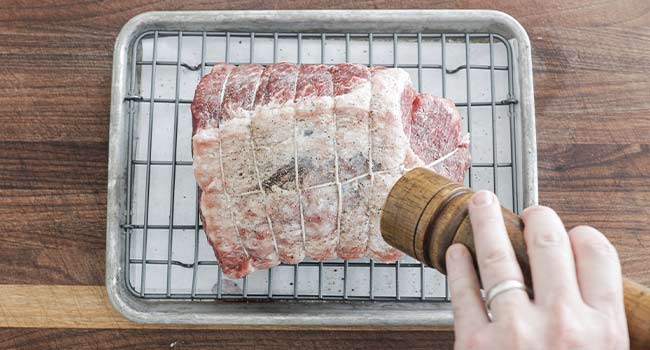
For the herb oil, combine the olive oil, parsley, thyme, rosemary, sage, garlic, shallot, salt, and pepper in a bowl.
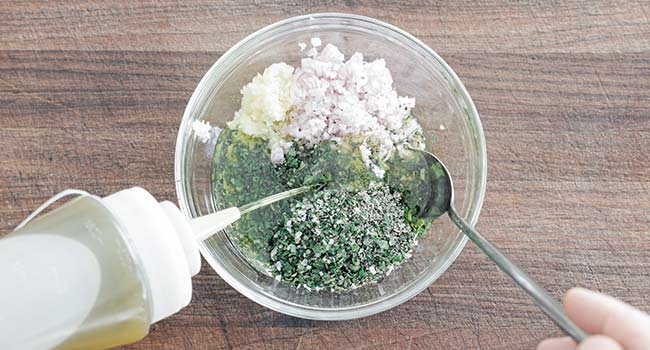
Brush all sides of the roast with 2/3 of the herb oil.
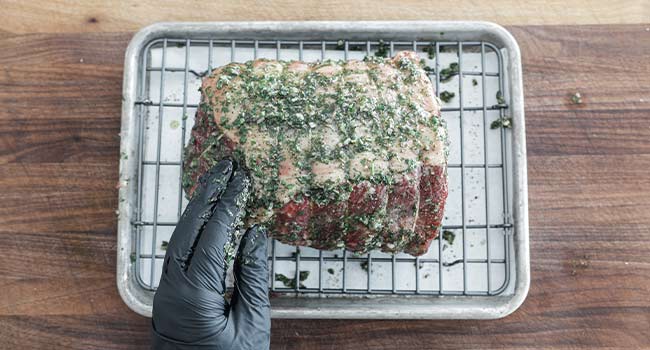
Place the beef roast in the oven. Roast at 300ºF until it reaches an internal temperature of 100ºF, then turn up the heat to 500ºF. Cook until it reaches 115°F internally.
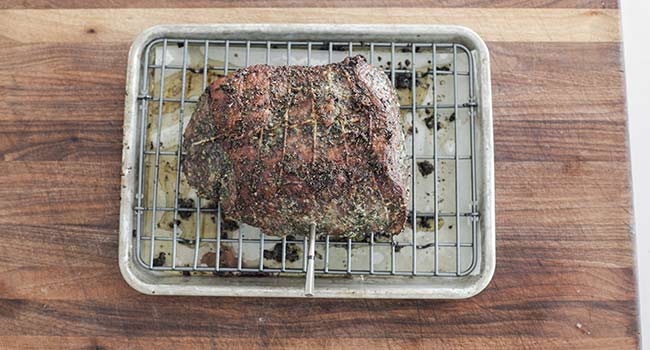
Take the bottom round roast out of the oven, brush it with the remaining 1/3 garlic and herb oil, and set it aside to rest.
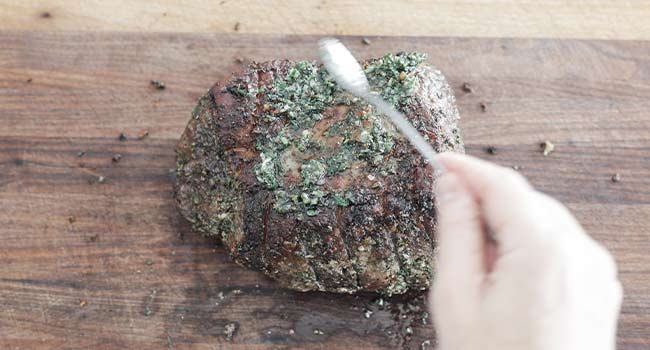
Remove the butcher’s twine, thinly slice the beef, and serve.
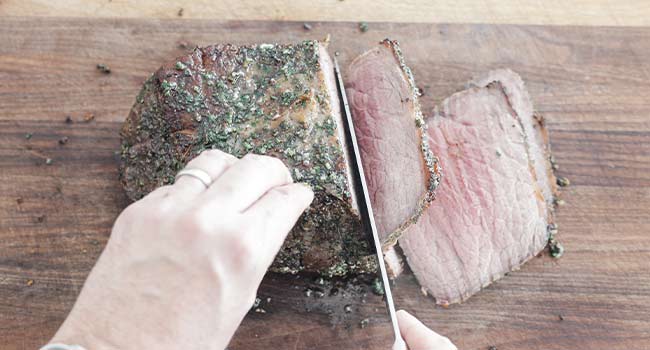
Make-Ahead and Storage
Make-Ahead: You can dry brine the beef up to 24 hours before cooking. Alternatively, cook the beef 1 hour before serving, but wait to slice it until it’s time to eat to prevent the natural juices from leaking too much. Cover the roast in aluminum foil to keep it warm.
How to Store: Cover the sliced or whole roast in foil and store it in the refrigerator for up to 4 days. It can also be frozen for up to 2 months. Allow it to thaw for 1 day in the fridge before reheating.
How to Reheat: Add your desired amount of slices and cook over medium heat in a skillet with a splash of beef stock until warmed through. Layer the leftovers in buns for incredible roast beef sandwiches, and serve with Parmesan Truffle Fries.

chef notes + tips
- If you don’t know how to truss beef, ask your butcher to do it when you buy the meat.
- The dry brine is optional but recommended, making the beef more tender and moist.
- Take the roast from the fridge 30 minutes before cooking for more evenly cooked, extra juicy meat.
- Use a meat thermometer to measure the internal temperature of the roast accurately. It’s critical to achieving a perfect rare to medium-well.
- Roast the bottom round uncovered to help the meat form an impressively crusty “bark” around the outside (the Maillard reaction).
- Slowly cooking the bottom round roast at a low temperature first will break down the naturally tough connective tissues and make them extra tender. Turning up the temperature afterward will give you that impressive crust on the outside.
- As it rests off the heat, the meat will increase in temperature by 2 to 5 degrees. Remove it from the oven at 5 degrees from your desired doneness.
- For medium-rare bottom round roast, cook the beef until it reaches an internal temperature of 130ºF to 135ºF. For medium, cook to 140ºF to 145ºF. For medium-well, cook to 150ºF to 155ºF.
- You can customize the herb oil with your favorite fresh herbs, a yellow or Dijon mustard drizzle, or a soy sauce or tamari splash.
- For more flavor, drizzle the pan drippings over the beef slices when serving, or save them from making homemade au jus or beef stock.
More Beef Recipes
- Perfect Beef Tenderloin Roast Recipe
- Braised Beef Short Ribs Recipe
- Roast Beef Recipe
- Smoked New York Strip Roast
- Homemade Corned Beef

Bottom Round Roast Recipe
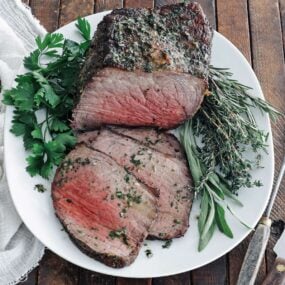
Ingredients
- 4-5 pound bottom round roast
- 1/3 cup olive oil
- ¼ cup finely minced fresh flat-leaf Italian parsley
- 2 tablespoons finely minced fresh thyme
- 2 tablespoons finely minced fresh rosemary
- 1 tablespoon finely minced fresh sage
- 3 finely minced garlic cloves
- 1 peeled and small diced shallot
- coarse salt and freshly cracked pepper to taste
Instructions
- Start by trussing the beef to help it keep shape and cook more evenly. You can ask your butcher to do this or see my how to truss a beef roast.
- Place the roast on a rack over a sheet tray and pat it dry on all sides with a paper towel.
- Generously season all sides of the bottom round with salt. It will probably be 1 ½ to 2 tablespoons of salt.
- Place the roast uncovered in the refrigerator for as little as 4 hours and up to 24 hours to dry brine.
- Preheat the oven to 300°.
- Once it’s done dry brining, remove it from the fridge and season it with pepper on all sides. Set it aside and leave it at room temperature to take some of the chill off.
- In the meantime, make the herb-oil by mincing and mixing the olive oil, parsley, thyme, rosemary, sage, garlic, shallot, salt, and pepper in medium-sized bowl.
- Coat the roast on all sides with 2/3 of the herb-oil mixture.
- Place a thermometer in the center of the beef roast and put it in the oven on a middle rack at 300° until it reaches 100° internally, which takes about 1 ½ to 2 hours.
- Once it reaches 100° internally, turn the oven heat up to 500° and cook until it reaches 115° internally, which takes about 20 to 25 minutes.
- Remove the roast from the oven, brush it with the remaining 1/3 garlic and herb oil, and let it rest at room temperature for 20 to 30 minutes.
- Remove the butcher’s twine and thermometer, and thinly slice the roast.

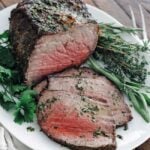
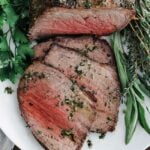
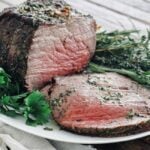
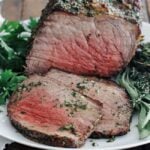
Do you wash the brine off before cooking? Does that not make the beef to salty?
nope
Question: the recipe states, “Place a thermometer in the center of the beef roast and put it in the oven on a middle rack at 300° until it reaches 100° internally, which takes about 1 ½ to 2 hours.
Once it reaches 100° internally, turn the oven heat up to 500° and cook until it reaches 115° internally, which takes about 20 to 25 minutes. Remove the roast from the oven, …, and let it rest at room temperature for 20 to 30 minutes.
But the notes state, “For medium-rare bottom round roast, cook the beef until it reaches an internal temperature of 130ºF to 135ºF. For medium, cook to 140ºF to 145ºF. For medium-well, cook to 150ºF to 155ºF.”
So…which is it? Do I remove the beef at 115 or at 130-135?
115.
I had a smaller roast, 2 1/2 lbs, but I followed the resized recipe. When printing the recipe I changed it to servings for 4, and the resulting change in ingredient amounts was nutty as in “0.13 cup finely minced flat leaf parsely”. So I did the best I could. The second application of the herb oil concoction is ill advised because it has raw garlic in it. Next time I would use all of the herb oil mixture before roasting. The resulting roast beef was very tasty and I would make this again with the modification I have mentioned. It is not Grandma’s standard roast beef, but much better.
Would this recipe work the same for Top Round beef roast labelled as “London Broil”?
It could.
Chef,
Always a pleasure reviewing your site. I like that you add in culinary terms (Maillard Reaction), and science behind your recipes. I also like that you have the option to jump to the recipe – just one more reason I’m a fan of yours and tell my students about your site.
Keep up the great work, love God and your family with all you’ve got and eat well.
Many thanks!